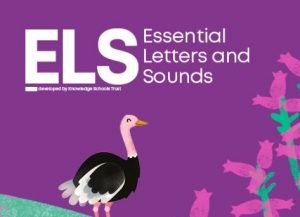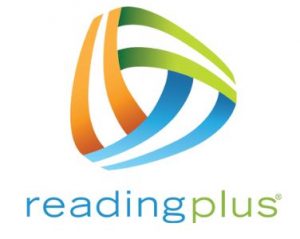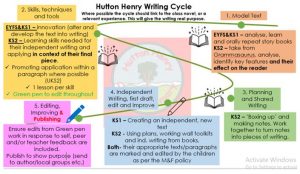Reading Policy – Hutton Henry CE Primary School
For more information about reading at home with your child, please click here.
Writing Policy – Hutton Henry CE Primary School
English Reading
At Hutton Henry C of E Primary School, reading is at the heart of our curriculum. We see reading as the key to children learning across the whole curriculum. It is our aim that all children should become competent, effective readers who decode accurately, read with comprehension and, most importantly, take enjoyment in reading. We aim to develop children who not only can read, but do read. Through a lively, engaging comprehension curriculum we seek to; develop children’s positive attitudes to reading so that they are committed, independent readers by the time they leave our school, teach children the skills and strategies they need to be able to understand and read effectively, whether they are reading for pleasure or finding information, improve their understanding – and hence their employment – of different sorts of text. We introduce children to a wide range of high-quality texts, both fiction and non-fiction, and to excellent authors and illustrators, in order to help them make informed choices for themselves about books they wish to read.
We promote the enjoyment of reading by carefully selecting high-quality texts that are used as a vehicle for learning across the curriculum. By providing our children with the skills to read, they can broaden their knowledge in a range of subject disciplines.
Opportunities are provided for a range of reading. Teachers model reading strategies during shared reading sessions. Pupils are able to have the opportunity to develop reading strategies and to discuss texts in reading sessions. Independent reading provides time for both assessment and 1-1 teaching. Discreet, well matched phonics lessons in Early Years and Key Stage One enable children to decode efficiently. This is continued into Key Stage Two where necessary. There are many opportunities to read in school, accessing a wide range of reading materials. Oxford Owl is used at home and at school. There is regular school library time for children to loan books. There are many opportunities for listening to stories and other texts being read by children/teachers and other adults. All classes have a collection of texts, dictionaries, thesaurus, fiction and non-fiction books.
Getting children to read independently is one of our core aims for our curriculum. In order to do this, we must promote reading at every opportunity. The best advert for reading are adults who are enthusiastic and knowledgeable about children’s books, who can recommend just the right book for a child at just the right moment. Teachers play an important part in making these recommendations. As a school we try to build on enthusiasm we create by providing books for borrowing. We ask parents to read regularly with their children. We recognise that it is difficult for some parents to read regularly with their children, for a variety of reasons. We provide advice for parents where we can. Infant children take home weekly reading books each week. One is linked specifically to their phonics learning and one is to be enjoyed with an adult who will read “with “ them ( “my book” “ our book”). Both are carefully linked to children’s ability. In addition, children will take home a free choice library book. Reception children also take home a sound book with high frequency words, including tricky words to allow them to become more fluent readers. Beyond the texts linked closely to a child’s phonics level and ELS, children remain on well matched Oxford reading books throughout Key Stage 2.
Assessment is used to ensure every child is making sustained progress. A range of assessments are completed termly. Children are assessed both on their fluency and comprehension skills. The school adopts a collaborative approach to working with parents in order to develop the reading skills in line with the school policy. This takes place in the form of annual parent workshops in both Reception and Year 1 dedicated to training parents in how to support with phonics at home. Also, there have been whole school parent workshops for reading where all parents can explore how we teach reading in school.
Long term planning assigns high quality, fiction, nonfiction and poetry texts to each year group every term throughout the year as well as identifying a range of genres to be covered throughout the year. Whole Class Reading takes place daily as part of English lessons as well as at other times of the day.. In Years 5 and 6, children use Reading Plus, an online reading programme which targets specific areas of reading. In addition to daily English.
Across school our main reading scheme is Oxford. Our chosen phonics scheme is Early Letters and Sounds ( Oxford) Children can access allocated, levelled eBooks online to read both at school and at home.

Reading Plus is an adaptive reading solution that integrates comprehension, vocabulary, motivation and reading efficiency into one programme. Reading Plus is used across Upper KS2 to engage and support children with their reading it assesses efficiency, but also measures and increases motivation and comprehension.

Phonics and Early Reading
Essential Letters and Sounds (ELS) is our chosen Phonics programme. The aim of ELS is to get all children to read well, quickly. It teaches children to read by identifying the phonemes (the smallest unit of sound) and graphemes (the written version of the sound) within words and using these to read words.
All members of staff are trained to teach ELS to ensure that we have an expert team of reading teachers led by our Reading/Phonics Lead. As a staff team, we regularly meet to review our practice and to practise teaching together. This ensures that all children receive high-quality first teaching every day. Our classrooms are well resourced to ensure that every child has the resources required to learn to read well.
To ensure all children learn to read well, quickly, children learn Phonics from the very start of Reception. It is explicitly taught every day during a dedicated slot on the timetable. Throughout the day, children use their growing Phonic knowledge to support them in other areas of the curriculum and have many opportunities to practise reading decodable texts precisely matched to the phonic knowledge. This includes reading 1:1 with a member of staff and during whole class reading sessions. We know that reading is a fundamental life skill and ensure that all children leave our school able to read well.
ELS is a whole class teaching model. This means that every single pupil has the same opportunities when learning to read. Learning to read well, early, is a priority for every child. Children who may find it harder to learn how to read are given extra support from their teacher every day. We ensure that all children learn to read well and keep up rather than have to catch-up.Daily Phonics lessons continue in Year 1 and further through the school to ensure all children become confident, fluent readers. We follow the ELS progression and sequence. This allows our children to practice their existing phonic knowledge whilst building their understanding of the ‘code’ of our language. As a result, children can tackle any unfamiliar words that they might discover. We teach children more rarely used GPCs through the ELS progression. This means that they can decode and read more words with increased fluency. ELS is supported by a wide range of completely decodable texts. These cover both fiction and non- fiction and are exciting and engaging for all our pupils. We match the home reading texts to each child’s current phonic knowledge to ensure that they consolidate their most recent teaching and learning at home. Children experience the joy of books and language whilst rapidly acquiring the skills they need to become fluent independent readers and writers. ELS teaches relevant, useful and ambitious vocabulary to support children’s journey to becoming fluent and independent readers.
More information about ELS Phonics Progression
At our school we begin by teaching the single letter sounds before moving to diagraphs (two letters spelling one sound), trigraphs (three letters spelling one sound) and quadgraphs (four letters spelling one sound). We teach children to:
- Decode by identifying each sound within a word and blending them together to read
- Encode by segmenting each sound to write words
The structure of ELS lessons allows children to know what is coming next, what they need to do, and how to achieve success. This makes it easier for children to learn the GPCs we are teaching (the alphabetic code) and how to apply this when reading. ELS is designed on the principle that children should ‘keep up’ rather than ‘catch up’. Interventions are delivered within the lesson by the teacher and any child who is struggling with the new knowledge can be immediately targeted with appropriate support. Where further support is required, 1:1 intervention is used where needed. These interventions are short, specific and effective. ELS is designed to make use of all the teaching time during the phonics lesson – through targeted support where required, reducing the need for external interventions – meaning that there is minimal disruption to curriculum teaching time. Where further phonic support is required in Key Stage 2, this is timetabled daily to ensure that any child rapidly catches up. Children are assessed in week 5 of each half term to ensure that any specific gaps can be targeted immediately. We reinforce the link between reading and writing in every ELS lesson through the independent application of the children’s understanding. We also ensure that all our teachers reference the learning from ELS lessons when writing as part of the wider curriculum.
Reading for Pleasure
Reading for pleasure is the most important gift you can give children but we also need to bring to life the joy of books” Jacqueline Wilson
If we don’t learn to love books we don’t read and if we don’t read widely we don’t think deeply” Michel Rosen
“Make Story time at the end of the day a special time, a fun time, devoted entirely to reading . . . No testing, no comprehension, no analysis, no interrogation. Let the children go home dreaming of the story, reliving it, wondering . . . The more time you spend in ‘dream time’ living in your head where the story is, imagining how the people involved would feel – then you can lose yourself utterly in the story.” Michael Morpurgo
In addition to the well planned and carefully considered diet of books children access in lessons and from the reading scheme, we ensure our children have access to a wide range of books that are available purely for pleasure. These books can be enjoyed in class and at home. Class libraries and the main school library are packed with high quality books to entice the children to read them. The books children read for pleasure should be judgment free, and children can access these for their own enjoyment.
Library Committee
We have an active and enthusiastic library committee who ensure the library is well sorted and well stocked. They lead a variety of reading initiatives which include World Book Day and community projects
English Writing
At Hutton Henry C of E Primary School, every child is given the opportunity to acquire the knowledge and skill necessary to become a competent author. We provide a rich reading environment and by doing so, our children are given the stimulus to write effectively with purpose. As reading and writing can intertwine, we promote a love of reading through high-quality texts that are used as a vehicle for learning across the curriculum.
Children are exposed to a word rich curriculum. Through immersion in high-quality texts, teachers identify and explicitly rich and varied vocabulary, providing them with the tools to become confident communicators, readers and writers. English lessons contain a balance of whole class teaching and group or individual work. The learning objectives for each lesson that the children undertake will be discussed before they proceed with the task so that children know exactly what is expected of them and this is made explicitly clear through the use of Jane Considine’s lenses. In order for pupils to write clearly, accurately and coherently, adapting their language and style in and for a range of contexts, purposes and audiences, the Hutton Henry Writing Cycle has been developed (see below).

Each writing lesson will include
- Reference to SPAG skills – Children should practice a previously taught SPAG skill.
- Key vocabulary – Relevant and focused vocabulary for the lesson are shared, discussed and defined with support of teachers encouraging clear and purposeful discussion throughout.
- Lesson overview strategies – Ensuring High Quality Teaching, our teaching toolkit strategies are employed where appropriate encouraging effective modelling, retrieval strategies, motivating teaching, accurate assessment and purposeful reflection from learners.
- Live Feedback- Given during every lesson for children to edit and redraft as they practice a skill. This means that the final piece can be published.
Assessment will take place live within the lesson and children’s provided with feedback to support their writing development. Termly writing assessments take place to inform teaching and support children’s development. Writing at length focusing on different genre is a key part of writing progression across school and self evaluation, editing and improving of work are encouraged within this progression model.
Our children will leave Hutton Henry C of E Primary School having had the opportunity to master skills in speaking, reading and writing that will prepare them for secondary education and life beyond the school gates. Carefully planned writing lessons allow our children to develop their skills, by adapting their language and style in and for a range of contexts, purposes and audiences. They are given the opportunity to apply their skills across the curriculum and they are encouraged to use language effectively to create a desired effect on the reader.
